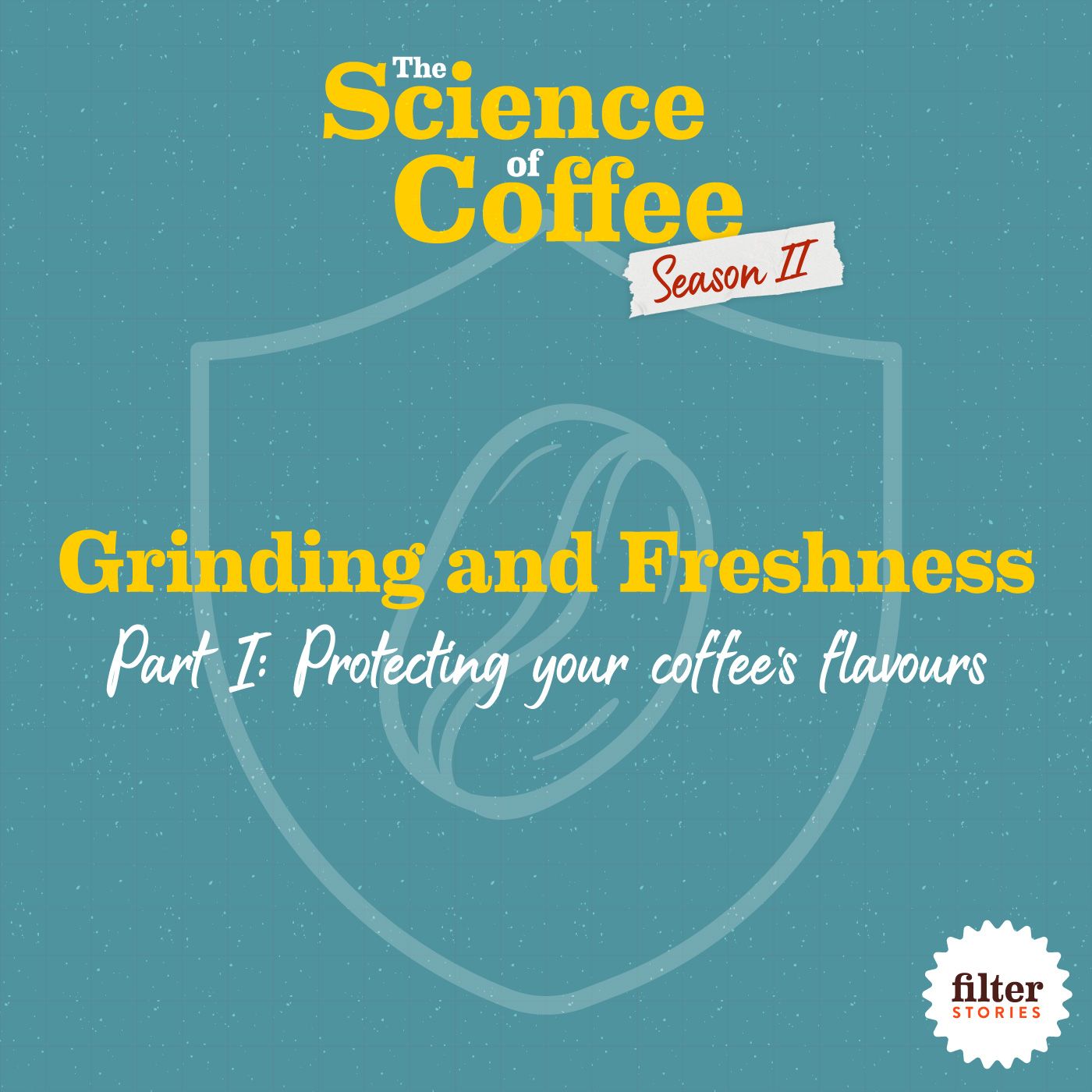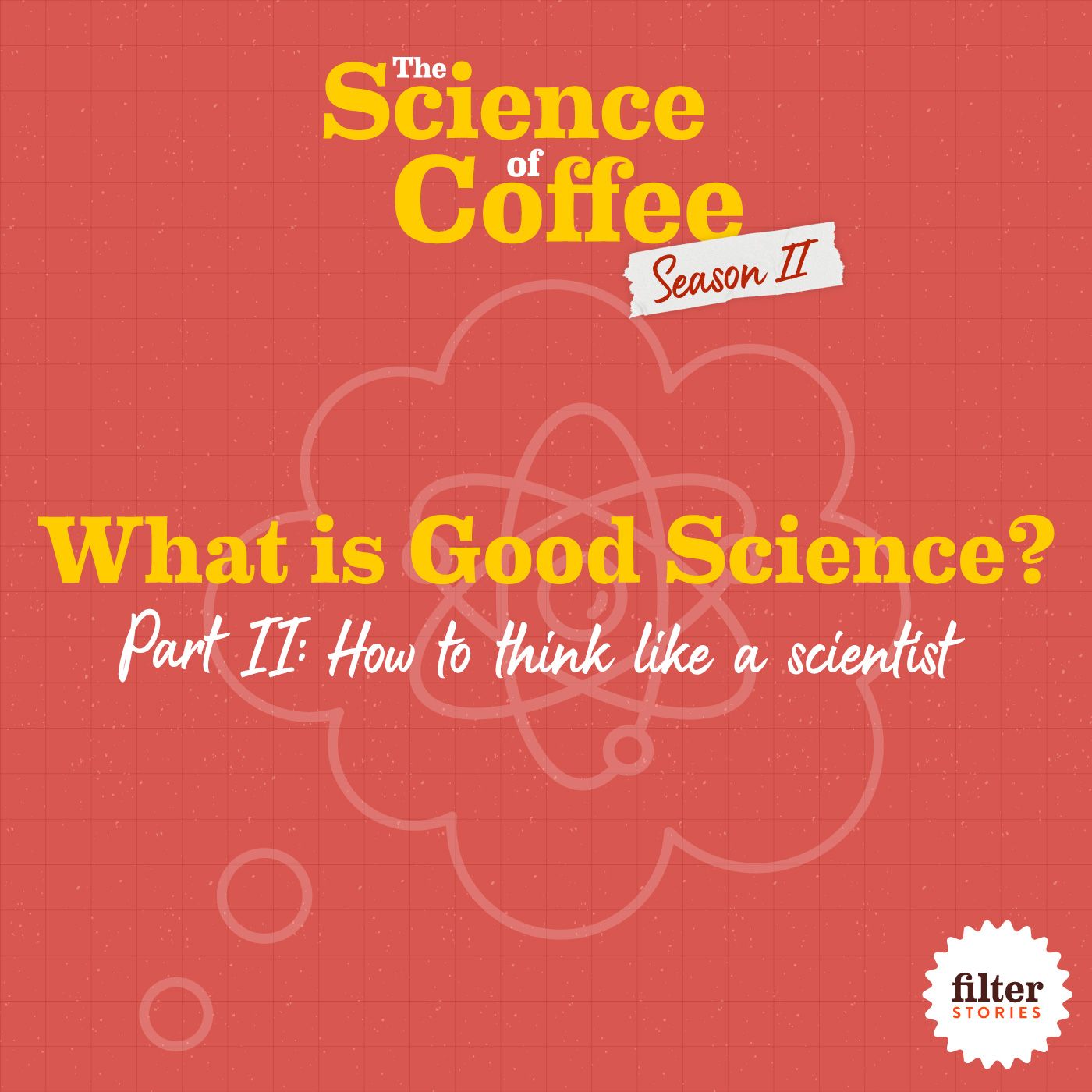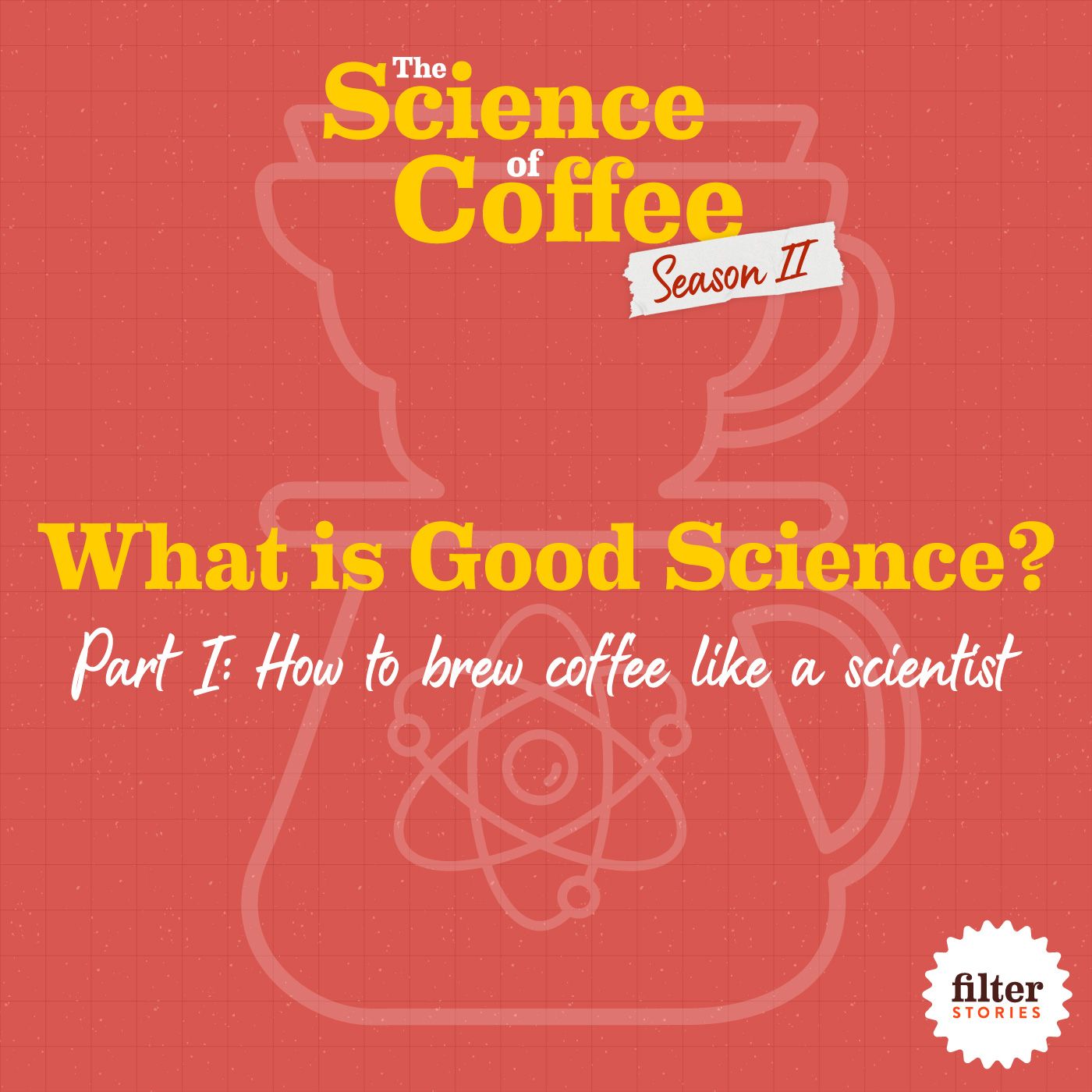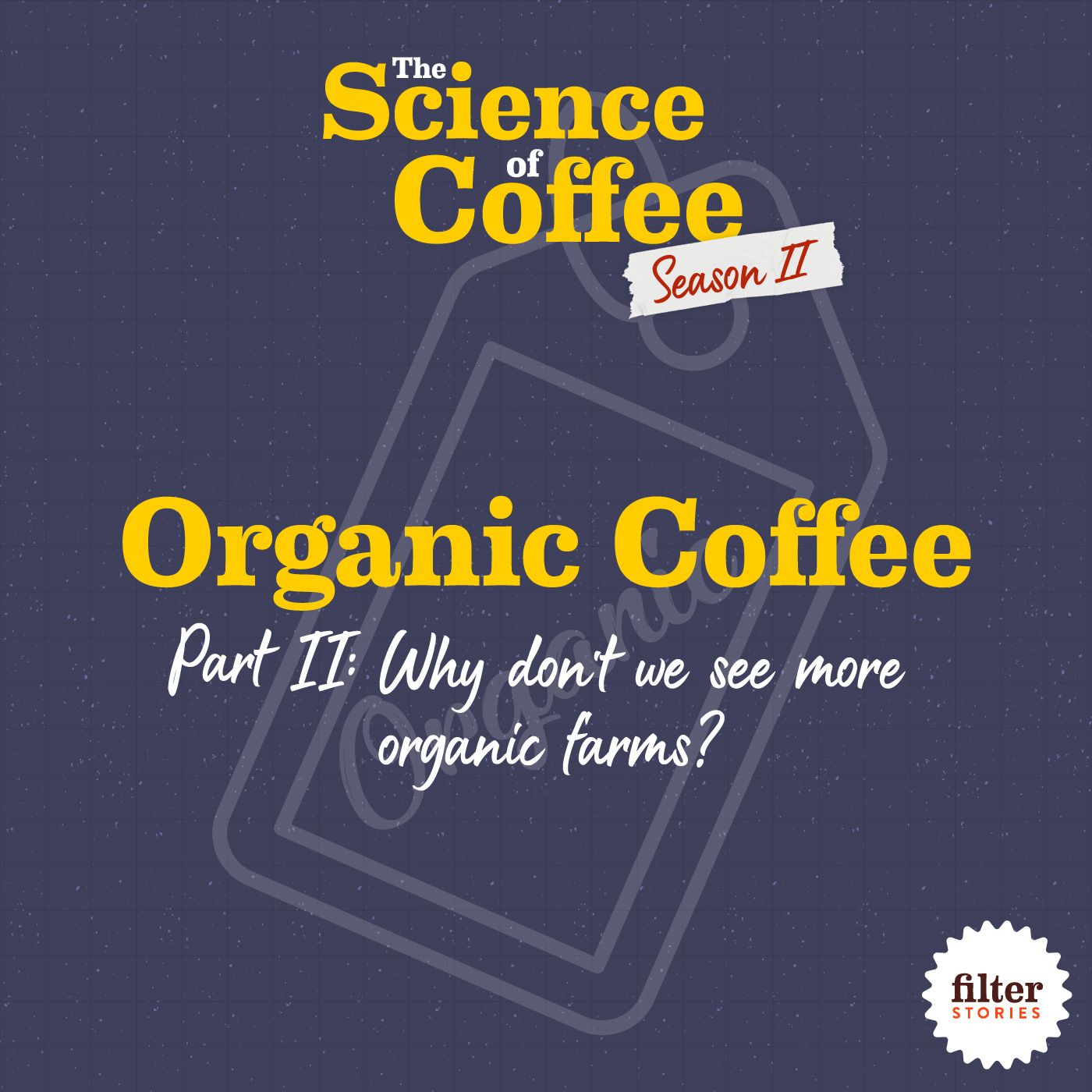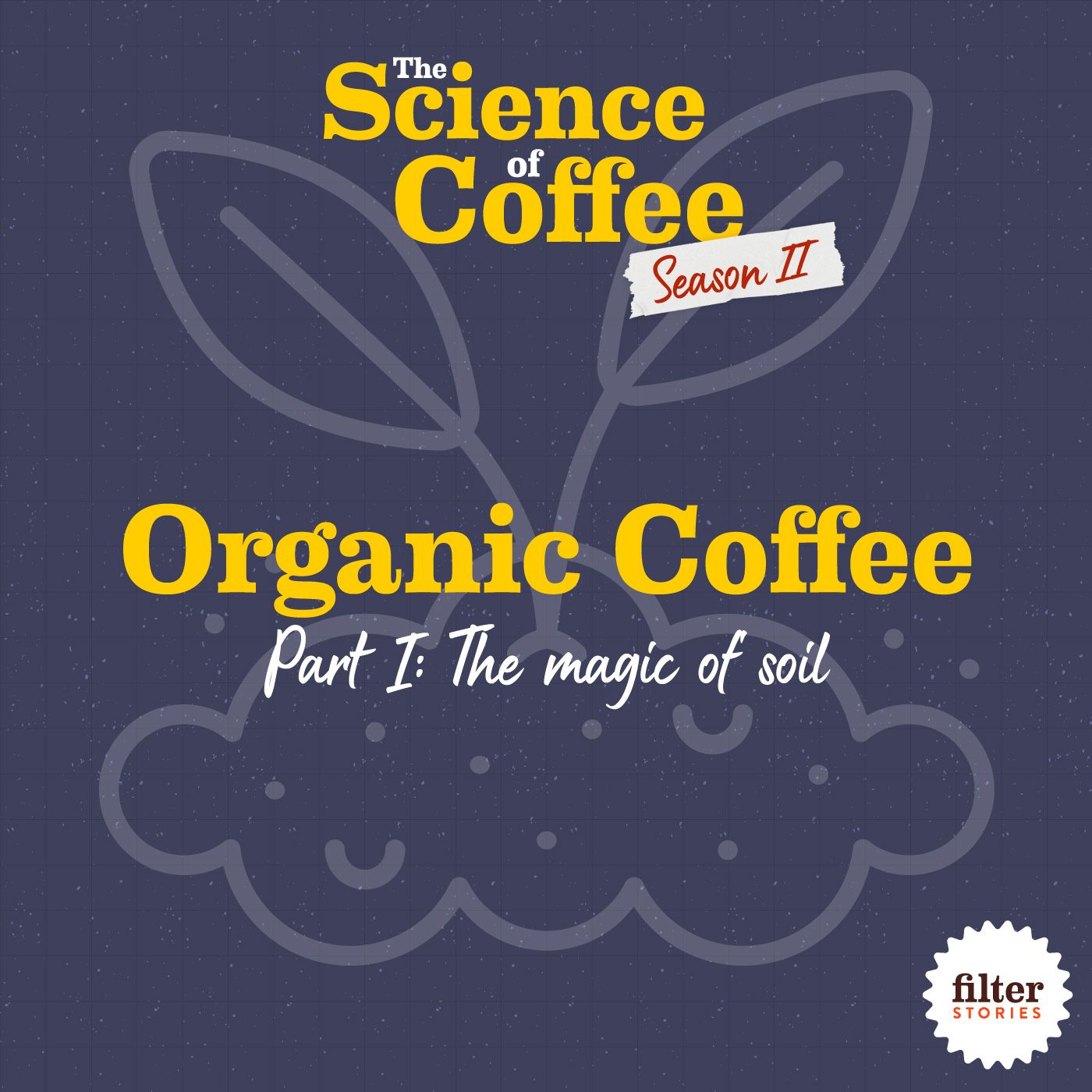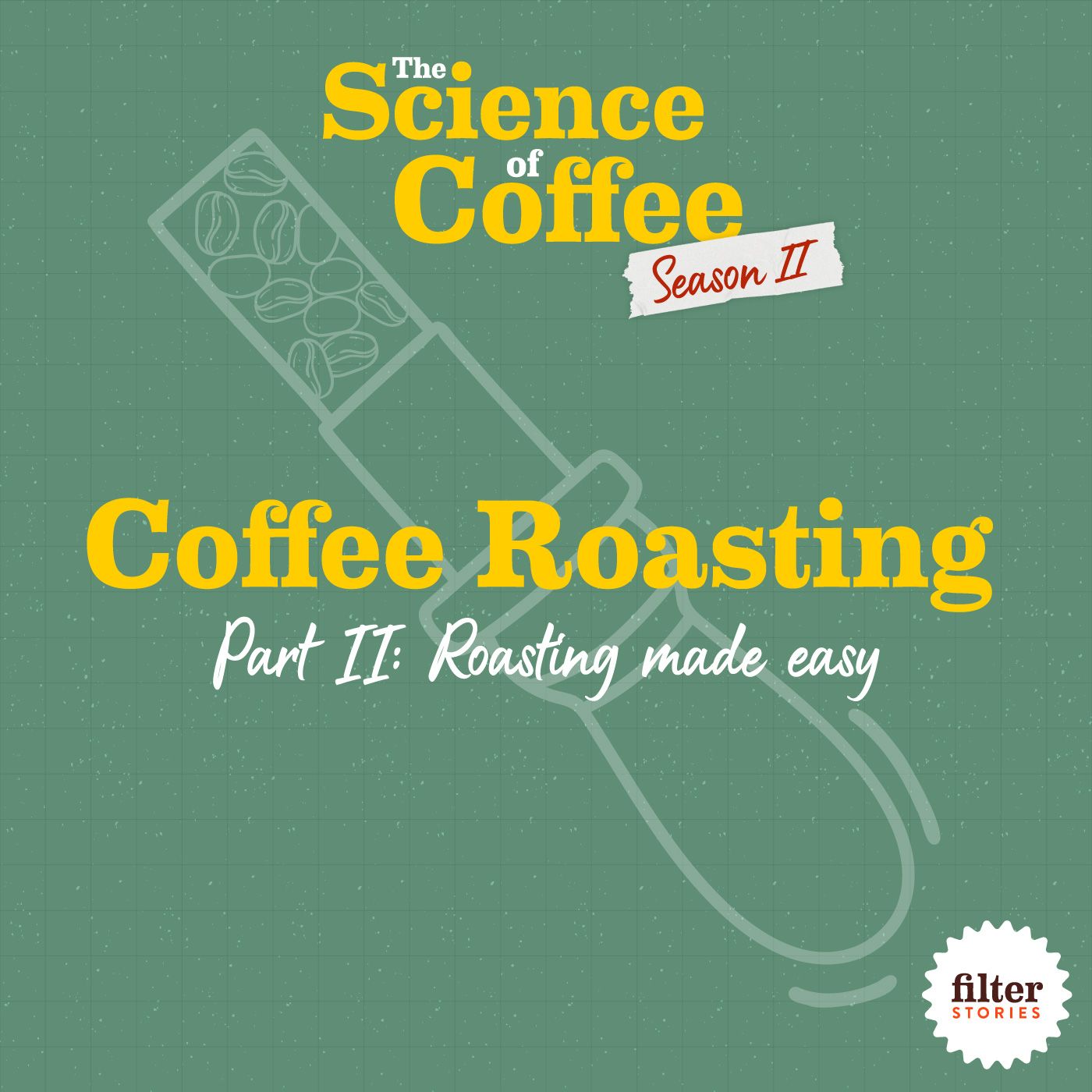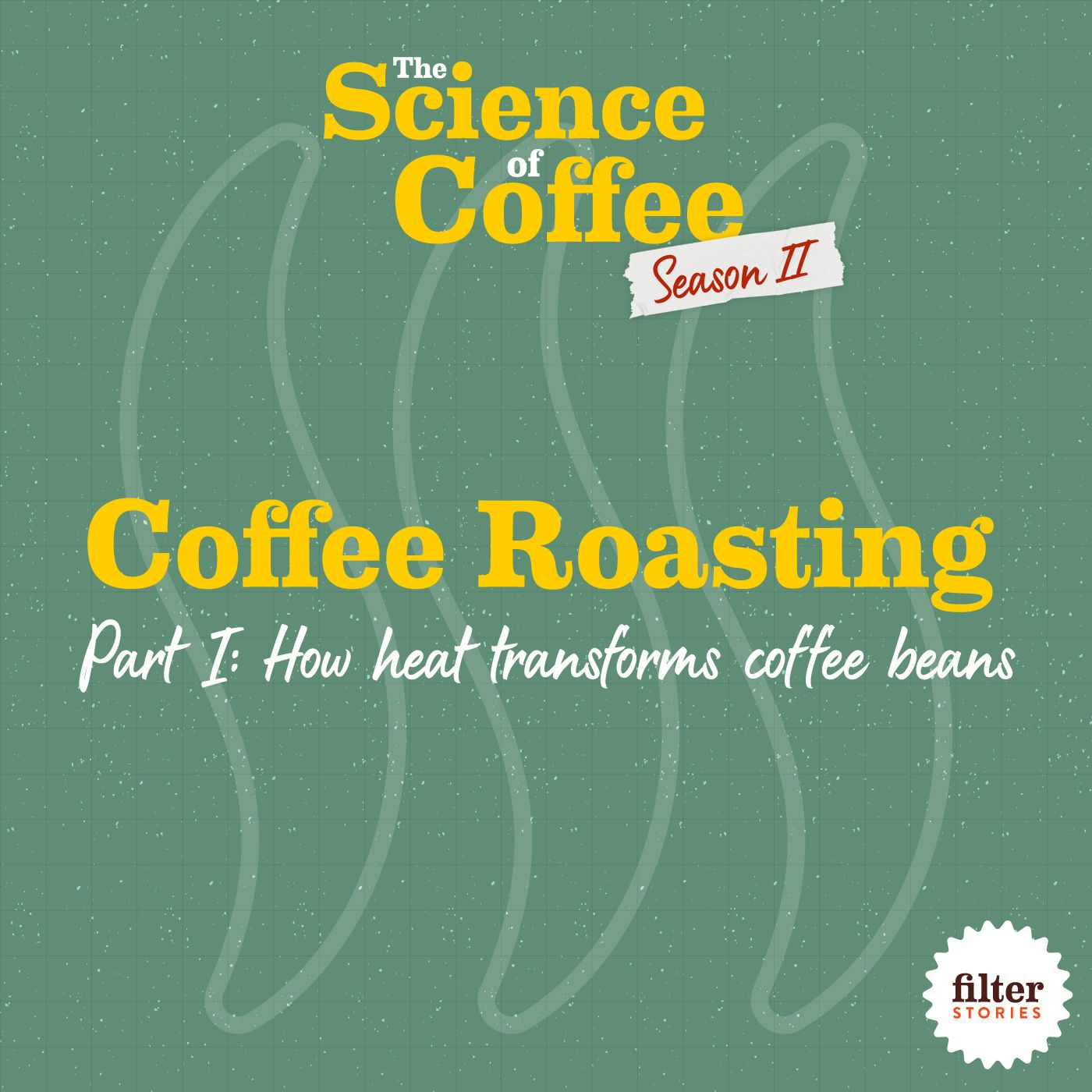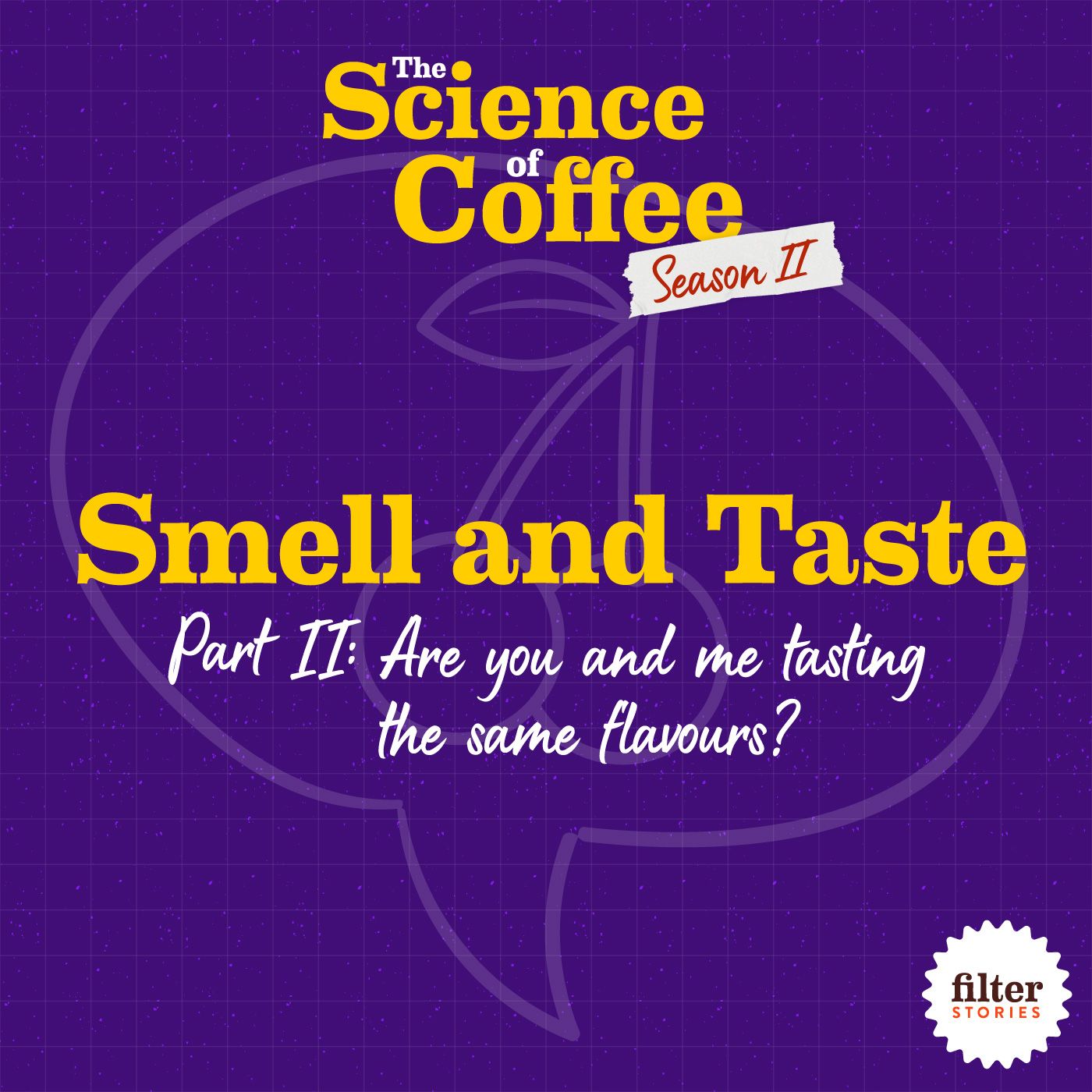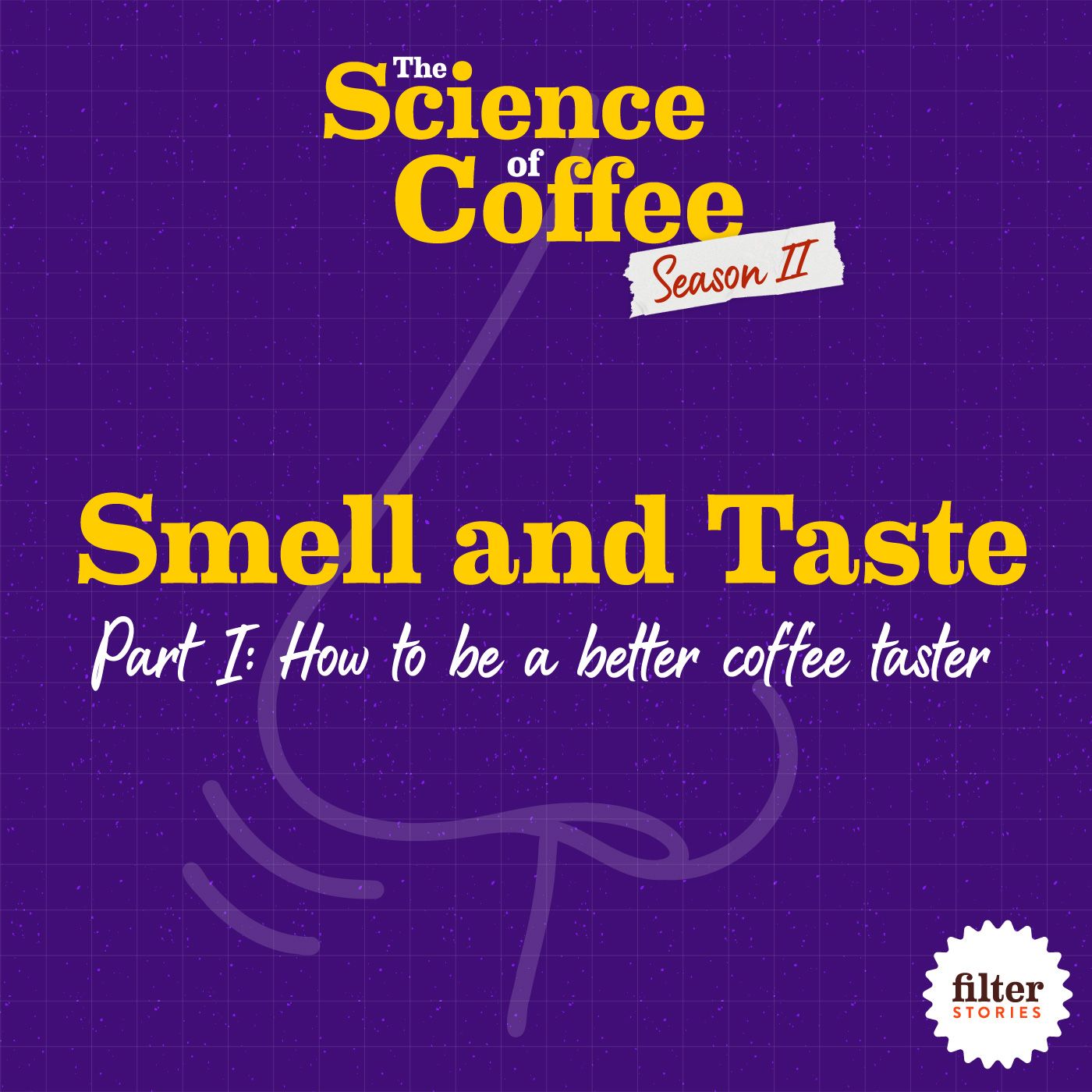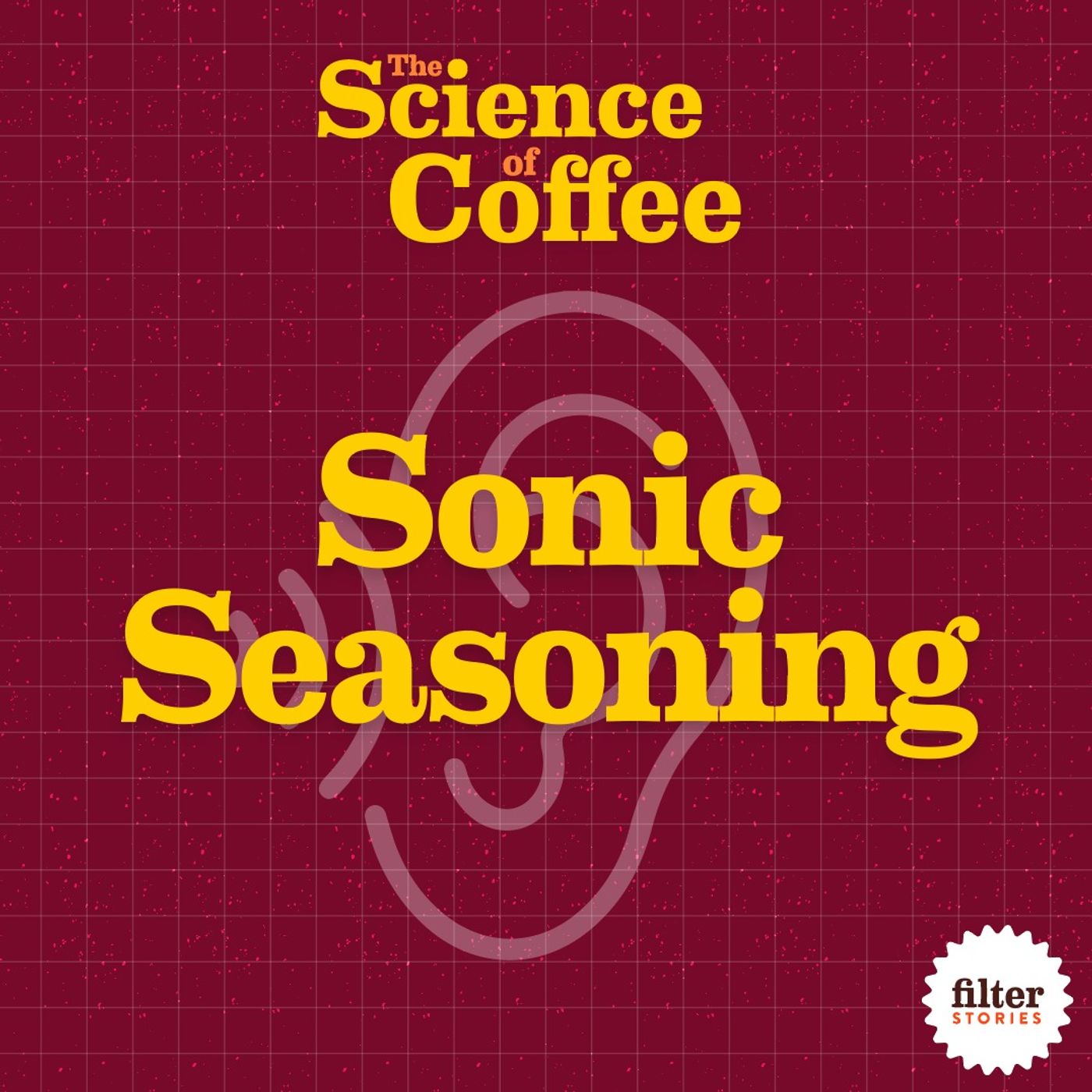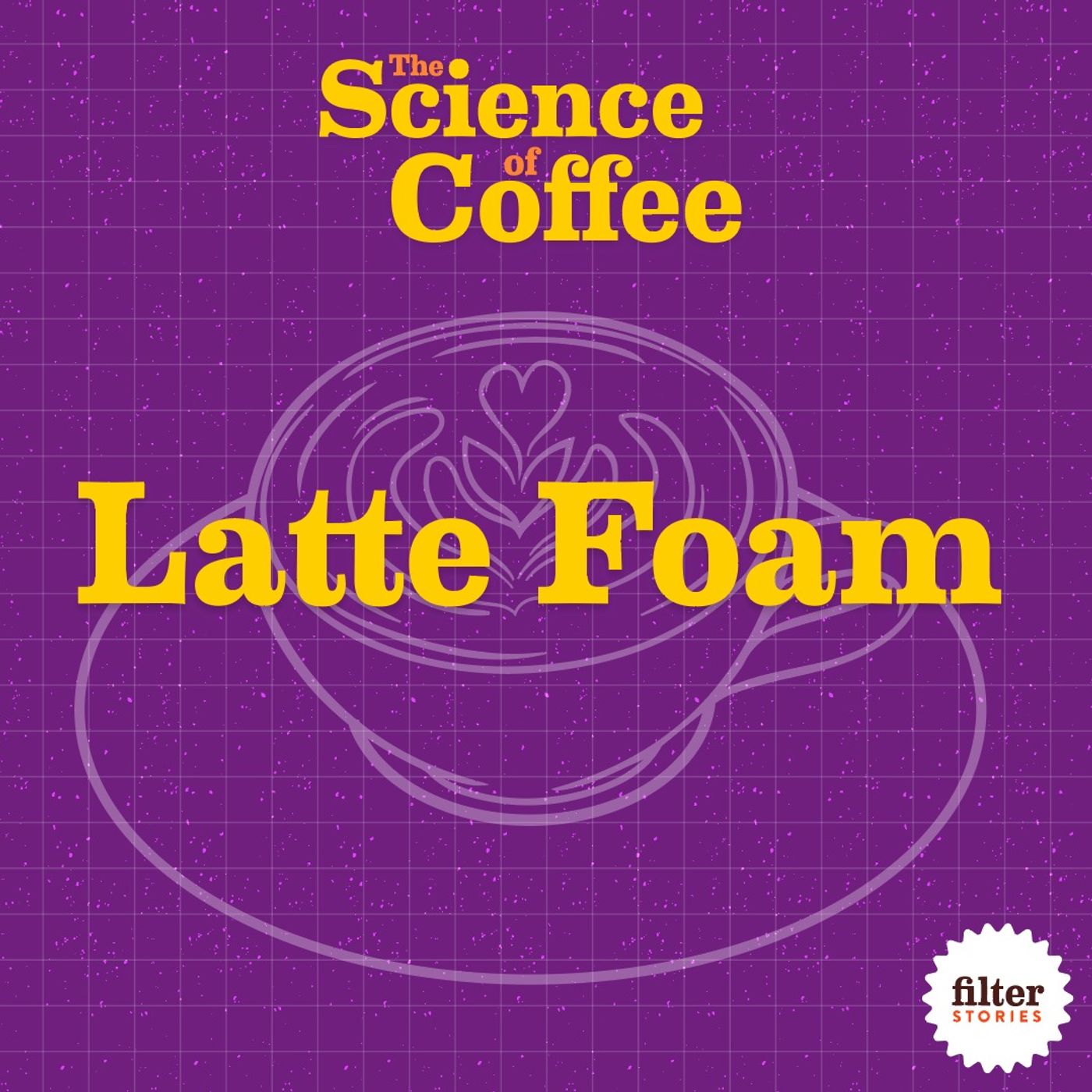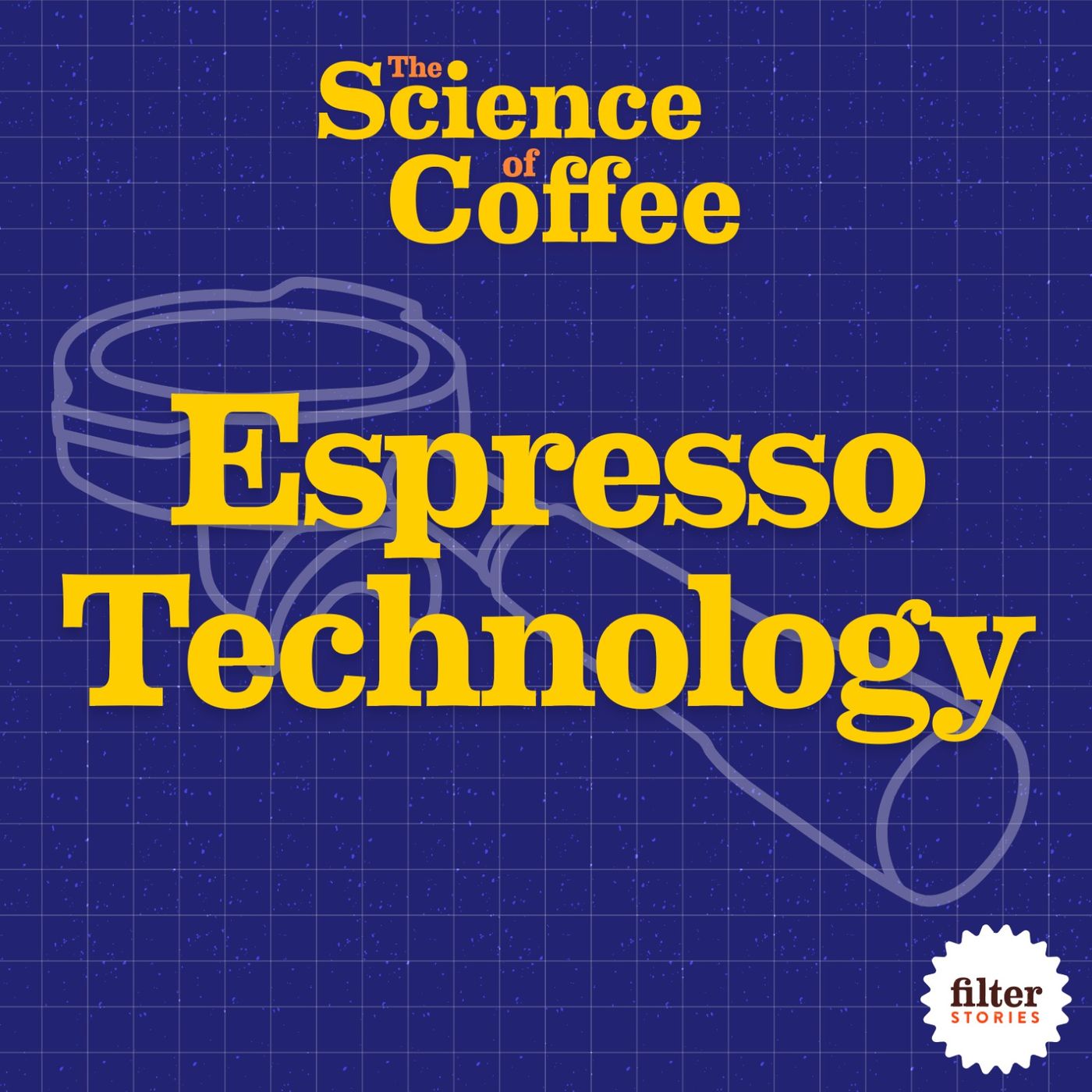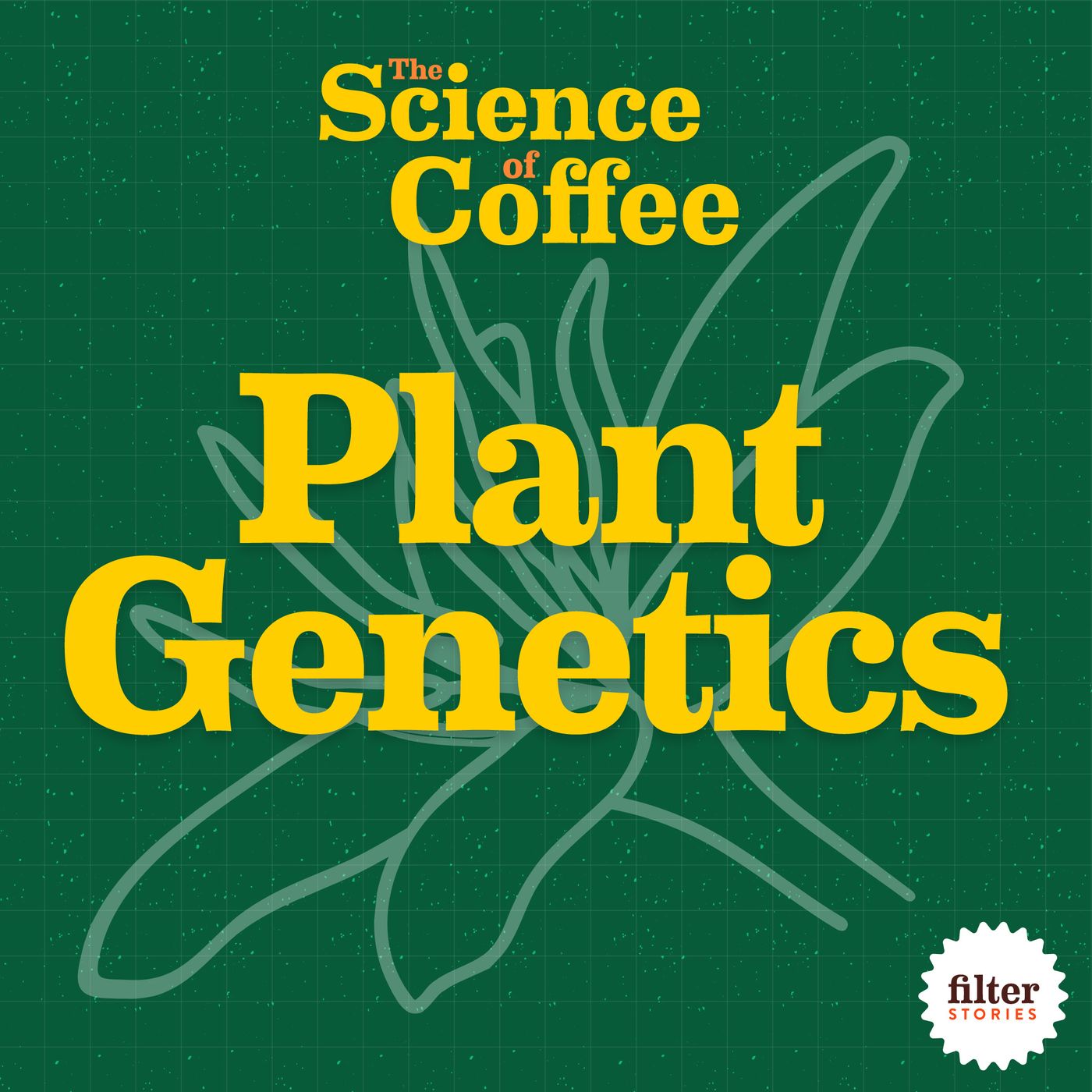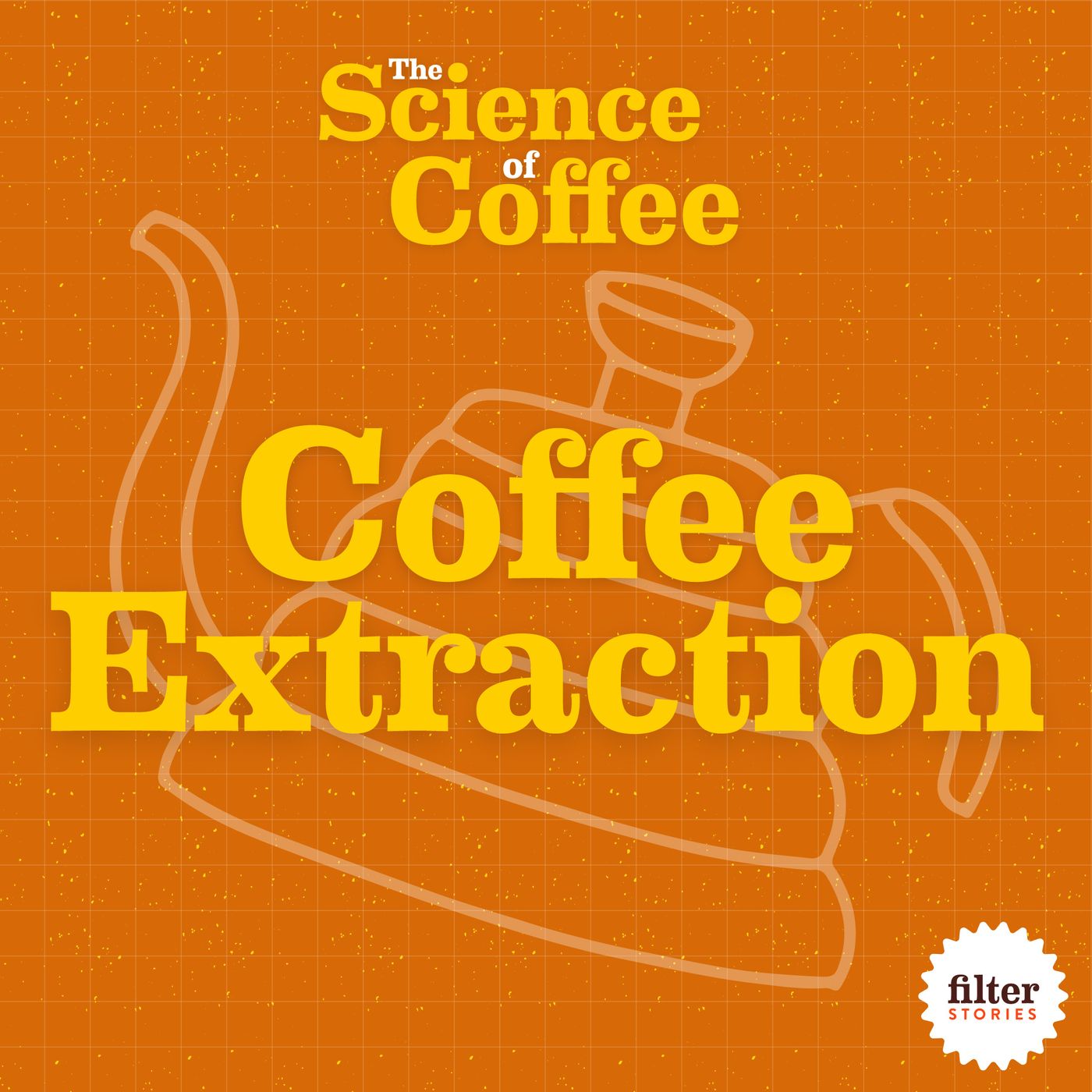Discover The Science of Coffee
The Science of Coffee

The Science of Coffee
Author: James Harper
Subscribed: 36Played: 468Subscribe
Share
© Copyright James Harper
Description
The Science of Coffee is a journey into coffee's hidden microscopic secrets to help you make even better coffee at home.
Documentary maker and coffee professional James Harper travels the world and speaks with leading coffee scientists to help you appreciate coffee more deeply.
You are going to get taken into the science of water, coffee extraction, plant genetics, espresso technology, latte foam, sonic seasoning, our sense of taste and smell, organic farming, roasting, grinding and freshness, and how to think like a scientist.
Press the Subscribe button so you don't miss future episodes!
The Science of Coffee is a spin-off series from James Harper's documentary podcast Filter Stories.
Follow James on Instagram: https://bit.ly/2Mlkk0O
Listen to Filter Stories: https://bit.ly/3ajoT5
Documentary maker and coffee professional James Harper travels the world and speaks with leading coffee scientists to help you appreciate coffee more deeply.
You are going to get taken into the science of water, coffee extraction, plant genetics, espresso technology, latte foam, sonic seasoning, our sense of taste and smell, organic farming, roasting, grinding and freshness, and how to think like a scientist.
Press the Subscribe button so you don't miss future episodes!
The Science of Coffee is a spin-off series from James Harper's documentary podcast Filter Stories.
Follow James on Instagram: https://bit.ly/2Mlkk0O
Listen to Filter Stories: https://bit.ly/3ajoT5
17 Episodes
Reverse
For your coffee to taste its best, it’s crucial you buy fresh roasts and grind fresh.….….Or maybe not. When I began creating this episode, I was convinced that ‘fresh is best’. But, after delving into the science of coffee freshness, I don’t believe that anymore. This episode goes deep into how diffusion and oxidation changes a coffee’s flavours.You’ll learn what it takes to store your coffee grounds unbelievably well. So well, that if you do it right, you will struggle to taste the difference between two month old coffee compared to those same beans freshly ground!But here’s the weirdest thing: Maybe, just maybe, you will prefer old coffee more than the fresh stuff.----------Please spread the word about The Science of Coffee!Discover how I make these Filter Stories episodes by subscribing to my Substack newsletter. Leave a 5 star rating on SpotifyFollow me on Instagram and tag me in an Instagram storyWrite a review on Apple PodcastsExplore Mahlkönig’s range of world leading grinders, trusted by baristas globally.Dive deeper into the science of coffee freshnessDo a Certificate of Advanced Studies with the Coffee Excellence CentrePick up a copy of the SCA’s Coffee Freshness HandbookConnect with my very knowledgeable guestsSamo Smrke - Instagram19 Grams Coffee Roasters in Berlin - InstagramArnaldo Rodrigues - LinkedInThe Science of Coffee is made possible by these leading coffee organisations:BWT Water and MoreMarco Beverage SystemsROESTSustainable HarvestMahlkönigThe Science of Coffee is a spin-off series from James Harper's documentary podcast Filter Stories
In the last episode, I discovered that rinsing my Chemex filter papers was a waste of time! As a result I’ve managed to claw back over seven days of my life left on earth. But why stop there? The coffee industry is full of elaborate ways of brewing and savouring coffee: fancy drippers, cold metal balls, “slurp-able” cupping spoons.These are very fun, but how many of them actually affect the flavour of our coffee?I fear elaborate coffee gear is wasting our time and money. They're distracting us from the existential crises in coffee that actually require all our attention now. For example, the issue of farmers who grow delicious coffees quitting the business because it’s just getting too hard. But to figure out whether a popular new coffee tool was actually waste of time or not, I needed to think like a scientist. This episode is the journey I went on to rewire my brain: I had to learn what good evidence looks like, what to do if I can’t find good evidence, and why it’s important to focus mostly on experimental results while resisting the allure of a compelling theory. Please spread the word about The Science of Coffee!Discover how I make these Filter Stories episodes by subscribing to my Substack newsletter. Leave a 5 star rating on SpotifyFollow me on Instagram and tag me in an Instagram storyWrite a review on Apple PodcastsDiscover this episode’s sponsor BWT’s water filtration products. I use their Penguin magnesium filter cartridges and cafes can use their BestAqua ROCDive deeper into the science of slurping, water and Signal Detection TheoryDo a Certificate of Advanced Studies with the Coffee Excellence CentreRead Georgiana’s paper on soup slurpingLearn more about Signal Detection TheoryExplore BWT White Paper on the effects of magnesium (German)Browse Christopher Hendon’s book Water for Coffee Take Barista Hustle's Water course Watch James Hoffman's water videoConnect with my very knowledgeable guestsMorten Munchow - Coffee Mind websiteJeremy Nelson - LinkedInSamo Smrke - InstagramGeorgiana Juravle - Google ScholarYoung Baek - InstagramFrank Neuhausen - LinkedInSergio Barbarisi - LinkedInAlessandro Genovese - LinkedInThe Science of Coffee is made possible by these leading coffee organisations:BWT Water and MoreMarco Beverage Systems ROEST Sustainable Harvest MahlkönigThe Science of Coffee is a spin-off series from James Harper's documentary podcast Filter Stories
Should you rinse your filter paper before making a filter coffee? Almost everybody in coffee internet says you should. But what if most of coffee internet was wrong?In this episode, I show you how I try to answer this question like a professional sensory scientist would. It’s hard. It’s frustrating. But ultimately, it’s worth it because I end up saving seven days of my life left on earth!Please spread the word about The Science of Coffee!Discover how I make these Filter Stories episodes by subscribing to my Substack newsletterLeave a 5 star rating on SpotifyFollow me on Instagram and tag me in an Instagram storyWrite a review on Apple PodcastsBring out vibrancy in your coffee with BWT’s magnesium water filters for the home and cafeDive deeper into sensory science methodologiesTake Becky Bleibaum’s free introductory sensory science course! Set up a triangulation yourself with DragonflySci’s worksheetsUnderstand Rose Marie Pangborn’s three step process better with Morten Münchow (“Pangborn’s Razor”)Do a Certificate of Advanced Studies with the Coffee Excellence CentreConnect with my very knowledgeable guestsMorten Munchow - Coffee Mind websiteBecky Bleibaum - LinkedInSamo Smrke - InstagramSophie Vo - LinkedInThe Science of Coffee is made possible by these leading coffee organisations:BWT Water and MoreMarco Beverage SystemsROESTSustainable HarvestMahlkönigThe Science of Coffee is a spin-off series from James Harper's documentary podcast Filter Stories
Farming coffee organically is amazing because soils are more alive, birds and insects are more plentiful, farmers avoid getting sick with agrochemicals. But, if it’s so great, why is less than 10% of the world’s coffee grown organically?The fact is, going organic is hard. Much harder than growing coffee conventionally. In this episode I show you the story of one of Central America’s most successful organic coffee cooperatives, RAOS, and the four big hurdles that stood in the way of their early founders who all dreamed of converting their farms to organic.This story changed my understanding of farming and is now the reason I choose organic specialty coffee whenever I can. Please spread the word about The Science of Coffee!Discover how I make these Filter Stories episodes by subscribing to my Substack newsletterFollow me on Instagram and tag me in an Instagram storyWrite a review on Apple PodcastsLeave a 5 star rating on SpotifyDive deeper into organic coffeeLearn more about Sustainable Harvest’s Most Valuable Producer programme, their cupping app Tastify, and explore their range of certified organic and Fairtrade coffeesExplore RAOS (Cooperativa Regional Mixta de Agricultores Organicos de la Sierra)'s story for yourselfAre you a coffee farmer? Get in touch with Lalo Perez VaraonaConnect with my very knowledgeable guestsLalo Perez Varaona - LinkedInJorge Cuevas - LinkedInAndrea Futterer - GEPA websiteOsman Contreras - LinkedInRoberto Rene Gonzales - Farm websiteThe Science of Coffee is made possible by these leading coffee organisationsBWT Water and MoreMarco Beverage SystemsROESTSustainable HarvestMahlkönigThe Science of Coffee is a spin-off series from James Harper's documentary podcast Filter Stories
The world’s farming soils are deteriorating quickly.Conventional coffee farming where plants are grown using agrochemicals allowed farmers to reap huge harvests these last 70 years. But these agrochemicals have been at the expense of soil health. I travel to Honduras to explore a potential solution: organic coffee farming.Come with me as I show you the organic farming tricks of Don Rufino, one of the region’s leading organic farmers. He nurtures the soil around his coffee trees using mountain microorganisms, a huge diversity of shade trees, attentive tree pruning, and very funky batches of homemade bug spray. The results speak for themselves: when I pick up a handful of his soil, it is moist, dense and writhing with life. Could these cultivation techniques be the answer to the coffee world’s declining soil health?Please spread the word about The Science of Coffee!Discover how I make these Filter Stories episodes by subscribing to my Substack newsletter! Follow me on Instagram and tag me in an Instagram storyWrite a review on Apple PodcastsLeave a 5 star rating on SpotifyDive deeper into organic coffeeExplore Sustainable Harvest’s range of certified organic and Fairtrade coffeesAre you a coffee farmer? Get in touch with Lalo Perez VaraonaCheck out Don Rufino’s organic cooperative, RAOSConnect with my very knowledgeable guestsLalo Perez Varaona - LinkedInTommie Hooft van Huysduynen - LinkedInAlison Streaker - LinkedInThe Science of Coffee is made possible by these leading coffee organisationsBWT Water and MoreMarco Beverage SystemsROESTSustainable HarvestMahlkönigThe Science of Coffee is a spin-off series from James Harper's documentary podcast Filter Stories
Roasting coffee can be maddening. Just 4° Celsius is enough to make the same green beans taste distinctly different! And there are so many things roasters can play around with: temperature, time, fan speed, drum speed, types of probes…the list goes on and on. So, if you want to start roasting yourself, where do you start!?In the first half of this episode, I interview one of the world's leading roasting teachers who takes me through his published scientific research to give a clear answer. It’s as simple as 80%, 15% and 5%. And then, in the second half, I show you why roasting coffee consistently batch-after-batch is so difficult. But these problems are finally being solved with smart technologies. I visited the ROEST engineering team in Oslo and cracked open their innovative prototype P3000 roaster to show you the technology that allows anybody to roast coffee consistently and fully automatically. I am so impressed with these innovations, I believe they’re going to change the coffee industry.Please spread the word about The Science of Coffee!Follow me on Instagram and tag me in an Instagram storyWrite a review on Apple PodcastsLeave a 5 star rating on SpotifyDive deeper into the science of roastingExplore ROEST’s innovative products for the coffee industry.Learn more from Morten Münchow and his coffee roasting coursesRead Morten’s paper in collaboration with the University of Copenhagen on Roasting Conditions and Coffee FlavourConnect with my very knowledgeable guestsSverre Simonsen - LinkedInCallum Gilmour - LinkedInVeronica Balduc - LinkedInMorten Münchow - Coffee Mind websiteScott Rao - InstagramThe Science of Coffee is made possible by these leading coffee organisationsBWT Water and MoreMarco Beverage SystemsROESTSustainable HarvestMahlkönigThe Science of Coffee is a spin-off series from James Harper's documentary podcast Filter Stories
What flavours do you want from your coffee?Every coffee bean begins its life green. And if you brewed it up without first roasting it, you’d get a yellow-green cup of grass-flavoured water.But, as soon you apply heat to a bean, the flavour can morph to from something quite vegetative to a very acidic unripe fruit, then a very sweet fruit, and eventually dark roasted flavours.This is the magic of coffee roasting!In this episode of The Science of Coffee, I show you a full roast in action on the ROEST P3000, taste how coffee flavours evolve from acidic to bitter, and speak to leading coffee roasting scientists to reveal the mind-bending chemical and physical transformations taking place. See for yourself Roest's innovative P3000 fully automatic roaster. Please spread the word about The Science of Coffee!Follow me on Instagram and tag me in an Instagram storyWrite a review on Apple PodcastsLeave a 5 star rating on SpotifyConnect with my very knowledgeable guestsMark Al-Shemmeri - LinkedInCallum Gilmour - LinkedInVeronica Balduc - LinkedInAnja Rahn - LinkedInIldi Revi - LinkedInSamo Smrke - InstagramMorten Münchow - Coffee Mind websiteThe Science of Coffee is made possible by these leading coffee organisationsBWT Water and MoreMarco Beverage SystemsROESTSustainable HarvestMahlkönigThe Science of Coffee is a spin-off series from James Harper's documentary podcast Filter Stories
Ever wonder why you and your friends can taste the same coffee, but you can’t agree on the flavour notes? Join me as I explore this metaphysical mystery! I speak with leading scientists and ask: are the flavour receptors in your nose and mouth the same as mine? How does music and the shape of a cup affect what we taste? What about our different cultural backgrounds and language? Best of all, I put all these questions to the test in the Athen’s World of Coffee trade show. Many poor unsuspecting Filter Stories spit, splutter and gasp in the name of science!---------See Marco Beverage Systems' SP9 for yourself, and discover their range of consistent and energy-efficient coffee brewers for your cafe. Please spread the word about The Science of Coffee!Follow me on Instagram and tag me in an Instagram storyWrite a review on Apple PodcastsLeave a 5 star rating on SpotifyConnect with my very knowledgeable guestsHelene Hopfer - LinkedInJoel Mainland - LinkedInFabiana Carvalho - InstagramJanice Wang - LinkedInFelipe Reinoso - LinkedInFreda Yuan - InstagramMandy Naglich - InstagramThe Science of Coffee is made possible by these leading coffee organisations:BWT Water and MoreMarco Beverage SystemsROESTSustainable HarvestMahlkönigThe Science of Coffee is a spin-off series from James Harper's documentary podcast Filter Stories
So you’ve just taken a sip of a very rare coffee, and flavours of passion fruit explode in your mouth.But here’s the thing: that flavour of passion fruit is not coming from your mouth. It’s not even coming from your nostrils. It’s being picked up behind your eyes!In this first episode of The Science of Coffee's second series, I unravel how our sense of smell and taste works to help you be a better coffee taster. I shrink us down microscopically and we dive into your tongue to show you why good black coffee tastes sweet, even though there’s no sugar in it. We then travel up into our noses and get stuck in a lot of mucus. This slime might be disgusting, but we need it to be able to smell well. And finally, with the help of tasting expert and author Mandy Naglich, I show you three effective ways you can train yourself to be a much better coffee taster without having to go on any expensive courses. The trick is to train our internal flavour prediction models!This episode will help you deepen your appreciation of coffee and its delicious complexity. ---------See Marco Beverage Systems' SP9 for yourself, and discover their range of consistent and energy-efficient coffee brewers for your cafe. Please spread the word about The Science of Coffee!Follow me on Instagram and tag me in an Instagram storyWrite a review on Apple PodcastsLeave a 5 star rating on SpotifyBecome a better coffee taster!Pick up a copy of Mandy Naglich’s book “How To Taste”Sign up for the Specialty Coffee Association’s Sensory Skills coursesDo an online sensory course with CoffeeMindConnect with my very knowledgeable guestsMandy Naglich - InstagramLinda Bartoshuk - WebsiteJoel Mainland - LinkedInFabiana Carvalho - InstagramJanice Wang - LinkedInPeter Giuliano - LinkedInBram De Hoog - InstagramThe Science of Coffee is made possible by these leading coffee organisations:BWT Water and MoreMarco Beverage SystemsROESTSustainable HarvestMahlkönigThe Science of Coffee is a spin-off series from James Harper's documentary podcast Filter Stories
We’re back with another series of The Science of Coffee!Across 10 science stories, narrative audio producer and coffee professional James Harper takes you on a journey into coffee's hidden microscopic secrets. James has spent the last year traveling to Central America, Greece, Norway, Switzerland and interviewing dozens of the world’s leading coffee scientists. This insights will help you appreciate coffee more deeply and make even better coffee at home. We'll explore organic coffee growing, delve into the science of roasting, uncover optimal storage and grinding techniques, enhance your tasting skills through sensory science, and share James' journey towards thinking more like a scientist. Press the Subscribe button so you don't miss future episodes! https://bit.ly/3TdDnHOFollow James on Instagram: https://bit.ly/2Mlkk0O The Science of Coffee is a spin-off series from James Harper's documentary podcast Filter Stories: https://bit.ly/3ajoT5eThe Science of Coffee is made possible by these leading coffee organisations:BWT Water and MoreMahlkönigMarco Beverage SystemsSustainable HarvestROEST
Imagine you’ve got a cup of coffee in front of you. You haven’t tasted it yet. You therefore don’t know what it tastes like, right? Wrong. Some scientists argue that you actually do know what it will taste like (more or less), and the act of tasting simply confirms what you have already imagined it will taste like. And that’s because a growing body of research is revealing that sight, sound and touch all affect your expectation of a coffee’s flavours. In this episode, I explore how certain sounds might make your coffee taste sweeter, while other sounds translate to bitterness. And I expose how some cafe owners might be ruining the flavours of the high-end specialty coffee you paid for without even realising it. In the second half, I show you why so many of our scientific questions about coffee are going unanswered. I take you deep into the future of coffee science by explaining who’s doing research into coffee science, why they’re doing it, how much it costs and how you can get involved. ----------Please spread the word about The Science of Coffee!Follow me on Instagram and tag me in an Instagram storyWrite a review on Apple PodcastsLeave a 5 star rating on SpotifyExplore the technology behind Fiorenzato’s AllGround home coffee grinderWant to listen to more documentary podcasts about coffee? Check out my Filter Stories podcast Get more involved in coffee science!Buy Brita Folmer’s The Craft & Science of CoffeeRead the Specialty Coffee Association's 25 Magazine for cutting edge insights into coffee science, business and sustainability, including Charles Spence’s article on sonic seasoningPartner with the Coffee Science FoundationExplore Felipe Reinoso Carvalho’s sonic research, including Diego Campos’ winning World Barista Championship routineApply to study at the UC Davis Coffee CentreDo an online course with ZHAW’s Coffee Excellence CentreSubscribe to Barista Hustle and complete their online coffee coursesBecome a member of the Barista Guild, Coffee Roaster’s Guild, Coffee Technicians Guild and attend their events!Connect with my very knowledgeable guestsCharles Spence - Academic profileFabiana Carvalho - InstagramJanice Wang - LinkedInFelipe Reinoso Carvalho - LinkedInChahan Yeretzian - LinkedInBill Ristenpart - Academic profilePeter Giuliano - LinkedInJenn Rugolo - LinkedInGiulia Bagato - LinkedInDenis Girardi - LinkedInThe Science of Coffee is made possible by these leading coffee organisationsBWT Water and MoreMarco Beverage SystemsTraboccaEversysOatlyFiorenzato
When was the last time you picked up a cappuccino with a mountain of foam perched on top? Maybe these are the cappuccinos you make every morning at home.I personally really, really dislike them! The foam is cold, raspy, and gets in the way of the actual coffee liquid.How much better would your mornings be if, instead, your cappuccino had that creamy, silky “microfoam” you find in a specialty coffee cafe?In this episode, I take you deep into the bubbles of latte foam to show you what makes them, what destroys them, and how you can craft mouth-melting lattes. Along the way I also settle the big debate: what is the actual difference between regular Oatly and Oatly Barista Edition!? ---------Please spread the word about The Science of Coffee!Follow me on Instagram and tag me in an Instagram storyWrite a review on Apple PodcastsLeave a 5 star rating on SpotifyTry Oatly Barista Edition (this episode’s sponsor) for yourselfWant to listen to more documentary podcasts about coffee? Check out my other show, Filter Stories Go deeper into latte foam science!Measure your latte foam’s bubble size! Marvel at tetrakaidecahedra foam for yourselfCheck out Steven Abbott’s brilliant science websiteLearn how to create microfoam with Lance HedrickStudy milk science with Barista Hustle’s online coursesConnect with my very knowledgeable guestsSteven Abbott - websiteRituja Upadhyay - LinkedInNidhi Bansal - LinkedInThom Huppertz - LinkedInSofia Eldhe - LinkedInToby Weedon - LinkedInThe Science of Coffee is made possible by these leading coffee organisationsBWT Water and MoreMarco Beverage SystemsTraboccaEversysOatlyFiorenzato
A good espresso is a sublime experience: rich, sweet, and wonderfully caffeinated. But, who woke up one morning and thought to themselves, ‘I’m going to build a contraption that forces a tiny amount of super hot water with incredible pressure through a bed of very finely ground coffee’?Well, the fact is, the first “espresso” machine built 150 years ago was awful in almost every way. Worst of all, if you gave that coffee to anybody on the street, nobody would say it’s even an espresso!But, over the decades, problems begat solutions that begat more problems that culminated in espresso machines like Eversys that produce gorgeous espressos at just the push of a button. And it’s got me wondering: what is the perfect espresso machine? How far can we go?But, before clicking play, be warned: this story gets explosive and bloody!-------Please spread the word about The Science of Coffee!Follow me on Instagram and tag me in an Instagram storyWrite a review on Apple PodcastsLeave a 5 star rating on Spotify Learn more about how Eversys espresso machines (this episode’s sponsor) produce high quality espressosListen to my A History of Coffee podcast series with Prof. Jonathan MorrisWant to listen to more documentary podcasts about coffee? Check out my other podcast, Filter StoriesPictures of the espresso machines featured in this episodeAngelo Moriondo (1884, “Big water boiler with gnarly bits”)La Pavoni Ideale (1905, "Fire hydrant")Gaggia Tipo Classica (1947, “Lever”)Faema E61 (1961, “Retro 60s toaster”)Eversys (2022, “push button”)Want to go deeper into espresso machine technology? Coffee Technician Guild’s Educational CoursesBarista Hustle’s The Espresso Machine courseRead Prof. Jonathan Morris’ book ‘Coffee: A Global History’Do your own coffee museum tour in Italy!MUMAC (Milan)Rancilio Officina 1926 (Milan)Accademia del Caffè Espresso (Florence)Connect with my very knowledgeable guestsJonathan Morris - InstagramHylan Joseph - LinkedInGiorgio Rancilio - LinkedInAnna Cento - LinkedInCarlos Gonzàlez - LinkedInSilvia Bartoloni - LinkedInJonathan Besse - LinkedInThe Science of Coffee is made possible by these leading coffee organisationsBWT Water and MoreMarco Beverage SystemsTraboccaEversysOatlyFiorenzato
How can you make better coffee at home? Well, an easy way is to buy higher quality beans. But, I’m concerned this is going to get harder and harder for you in the future. Climate change is making coffee taste worse while also pushing farmers into financial hardship. In this episode we explore how genetic development can produce a coffee tree that might save the day. Is there a wild coffee tree happily growing in the forests somewhere that could be our silver bullet? What about if we mix existing documented species together? But, the big problem is that genetic research is slow, and farmers can’t wait around. So, in the second half, we learn how coffee farmers in Kenya are trying to fix the problem right now. And I’m actually tentatively hopeful the beans you brew in the morning are not going to get worse. But, it all depends on you, me and the coffee industry making a couple of changes right now. —---Please spread the word about The Science of Coffee!Follow me on Instagram and tag me in an Instagram story - https://bit.ly/2Mlkk0OWrite a review on Apple Podcasts - https://apple.co/3sf87MVLeave a 5 star rating on Spotify - https://spoti.fi/3yHkjcVLearn more about how Trabocca, this episode’s sponsor, works with coffee farmers: https://bit.ly/3Tjn8bVSupport the work of World Coffee Research: https://bit.ly/3VtyoV6Become a member of Kew Gardens: https://bit.ly/3yFZ8b0Find some of Alvans Mutero’s (https://bit.ly/3T0NHTy) and Thiriku’s (https://bit.ly/3CCxHQJ) coffee to taste for yourselfLearn more about cloning coffee plants on my other podcast, Adventures in Coffee - https://bit.ly/3EFBmzGWant to listen to more documentary podcasts about coffee? Check out Filter Stories - https://bit.ly/3zb5vnOConnect with my very knowledgeable guests: Sarada Krishnan - LinkedIn (https://bit.ly/3rW9dwB) and Research Gate (https://bit.ly/3VvzDTq)Aaron Davis - Kew Gardens (https://bit.ly/3CAicZg)Hanna Neuschwander - LinkedIn (https://bit.ly/3MvW2Mi)Bernard Gichimu - LinkedIn (https://bit.ly/3VrOIFJ)Learn more about the coffee varieties discussed on this episode: SL 28 - https://bit.ly/3MvNIw6SL 34 - https://bit.ly/3rTX2QXRuiru 11 - https://bit.ly/3CXmDPfBatian - https://bit.ly/3EEls8MThe Science of Coffee is made possible by these leading coffee organisations:BWT Water and More - https://bit.ly/3EEpuxNMarco Beverage Systems - https://bit.ly/3T2YDzYTrabocca - https://bit.ly/3Tjn8bVEversys - https://bit.ly/3CBkp6XOatly - https://bit.ly/3exvlKSFiorenzato - https://bit.ly/3T3nmUQ
How you brew your coffee dramatically affects what you taste. And I do mean dramatic! Brewing up the same bag of coffee beans can taste like a slice of heaven, or a slap in the face. So, what exactly is happening at a microscopic level when water swirls through coffee grinds? Why does boiling water extract certain flavours, while letting the kettle cool for five minutes make it taste markedly different? In this episode, we dive deep into the academic research conducted at the UC Davis Coffee Center so you can choose your flavour adventure: Do you like your coffees when they’re a sour bomb? A floral caress on the lips? A smokey drag on a pipe? Or a treacle of sweet syrup? We also explore why it can be so difficult getting the same flavours from the same beans consistently. And finally, I equip you with tools so you can begin finding your perfect brew. —---Please spread the word about The Science of Coffee!Follow me on Instagram and tag me in an Instagram story - https://bit.ly/2Mlkk0OWrite a review on Apple Podcasts - https://apple.co/3sf87MVLeave a 5 star rating on Spotify - https://spoti.fi/3yHkjcVExplore this episode’s sponsor Marco Beverage Systems SP 9 brewer and how it delivers consistent brews in the cafe (https://bit.ly/3Tgh18r)Listen to the Adventures in Coffee episode about making dramatically different brews using the Aeropress: https://bit.ly/3TghsQ7 Want more to listen to more documentary podcasts about coffee? Check out Filter Stories - https://bit.ly/3zb5vnOWant to go deeper into coffee extraction? Mackenzie Batali’s fractionation research - https://bit.ly/3CFnvH0UC Davis’ brewing control chart research - https://bit.ly/3CLoiGzTake courses on coffee brewing with the Specialty Coffee Association - https://bit.ly/3EQFoVVStudy at the UC Davis Coffee - https://bit.ly/3TwSgodRead ‘The Craft and Science of Coffee’ - https://bit.ly/3zb7bN8 Connect with my very knowledgeable guests: Samo Smrke - LinkedIn (https://bit.ly/3EKrjtg) and Instagram (https://bit.ly/3IdrfRz)Bill Ristenpart - Academic profile (https://faculty.engineering.ucdavis.edu/ristenpart/)Mackenzie Batali - LinkedIn (https://bit.ly/3s7VRxr)Peter Giuliano - LinkedIn (https://bit.ly/3yT66tv)Danny Pang - LinkedIn (https://bit.ly/3Sd9mqq)David Walsh - LinkedIn (https://bit.ly/3VEH7Uo)The Science of Coffee is made possible by these leading coffee organisations:BWT Water and More - https://bit.ly/3EEpuxNMarco Beverage Systems - https://bit.ly/3T2YDzYTrabocca - https://bit.ly/3Tjn8bVEversys - https://bit.ly/3CBkp6XOatly - https://bit.ly/3exvlKSFiorenzato - https://bit.ly/3T3nmUQ
Water really matters when you’re brewing coffee. Different waters can dramatically change how a single coffee will taste. But what is the right water for the best coffee? In this episode I will give you the answer, but I will first take you back billions of years to tell you the story of a single mineral and how it's responsible for making our coffees taste lame. Because here’s the thing: water science is chemistry, and chemistry is very complicated and easily forgettable. But with a great story, I’m hoping you’ll remember!In the second half, I show you why Christopher Hendon’s book Water for Coffee made a big splash in the coffee community, but also why some academic chemists are critical of the book, and how this all manifested in the creation of the Specialty Coffee Association’s Water Quality Handbook. And, to cap it all off, I offer you some environmentally conscious ways to get hold of good water for coffee, so your coffee brews can finally explode in flavour. —---Please spread the word about The Science of Coffee!Follow me on Instagram and tag me in an Instagram story - https://bit.ly/2Mlkk0OWrite a review on Apple Podcasts - https://apple.co/3sf87MVLeave a 5 star rating on Spotify - https://spoti.fi/3yHkjcVDiscover this episode’s sponsor BWT’s water filtration products. I use their Penguin cartridges (http://bit.ly/3Xiuq2a) and cafes can use their BestAqua ROC (https://bit.ly/3EPLIx9)Read Marcia Bjornerud’s amazing book, Reading The Rocks: https://bit.ly/3EQIYj4Want more to listen to more documentary podcasts about coffee? Check out Filter Stories - https://bit.ly/3zb5vnOWant to go deeper into water chemistry? SCA’s Water Quality Handbook: https://bit.ly/3TyWM5X BWT White Paper on the effects of magnesium (German): https://bit.ly/3TqOFbqHow to add magnesium to your soft water out of the tap (scroll to bottom): https://bit.ly/3s5WYOmChristopher Hendon’s Water for Coffee: https://amzn.to/3Tbo3LSCertificate of Advanced Studies at Zurich’s Coffee Excellence Center online course: http://bit.ly/3xlIOelRead ‘The Craft and Science of Coffee’: https://bit.ly/3zb7bN8 Barista Hustle's Water course - https://bit.ly/3z8zSKAJames Hoffman's water video - https://bit.ly/3Duxn8fConnect with my very knowledgeable guests: Samo Smrke - LinkedIn (https://bit.ly/3EKrjtg) and Instagram (https://bit.ly/3IdrfRz)Chahan Yeretzian - Linkedin (https://bit.ly/3S4emO1)Frank Neuhausen - LinkedIn (https://bit.ly/3gg4Fie)Marcia Bjornerud - Academic profile (https://bit.ly/3eCYuEi)Christopher Hendon - LinkedIn (https://bit.ly/3EXULMe) and Instagram (https://bit.ly/3eAUuo3)The Science of Coffee is made possible by these leading coffee organisations:BWT Water and More - https://bit.ly/3EEpuxNMarco Beverage Systems - https://bit.ly/3T2YDzYTrabocca - https://bit.ly/3Tjn8bVEversys - https://bit.ly/3CBkp6XOatly - https://bit.ly/3exvlKSFiorenzato - https://bit.ly/3T3nmUQ
The Science of Coffee is a journey into coffee's hidden microscopic secrets to help you make even better coffee at home. Across six episodes, documentary maker and coffee professional James Harper takes you deep into the world of water for coffee, coffee extraction, plant genetics, espresso technology, latte foam and sonic seasoning. Press the Subscribe button so you don't miss future episodes!The Science of Coffee is a spin-off series from James Harper's documentary podcast Filter Stories. Follow James on Instagram: https://bit.ly/2Mlkk0OListen to Filter Stories: https://bit.ly/3zb5vnOThe Science of Coffee is made possible by these leading coffee organisations: BWT Water and MoreMarco Beverage SystemsTraboccaEversysOatlyFiorenzato


